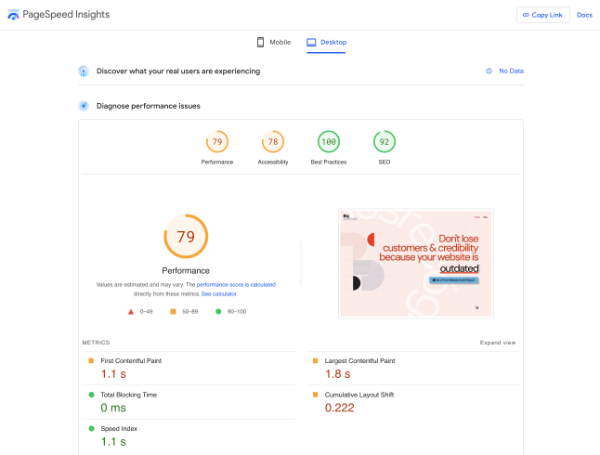TLDR
Why does website speed matter?
Your website speed has a significant impact on the effectiveness of your website including user behavior and business outcomes.
- Traffic – 53% of mobile users abandon a website that takes longer than 3 seconds to load.
- Conversion – 82% of consumers say slow page speeds impact their purchasing decisions.
- SEO – page load speed is important for Search Engine Optimization. Slower websites rank lower.

Here's how to test your website's speed.
- Go to https://pagespeed.web.dev
- Enter your web page’s URL.
This is Google’s free tool to test your website speed. The report includes reccomendations to imoprove your website’s speed.
Full Article
Why Website Speed Matters: The Key to Online Success
In the digital realm, website speed is not just a technical metric; it’s a critical component of a site’s success. As the virtual world becomes increasingly fast-paced, the need for quick-loading websites has never been more pronounced. This article delves into the profound impact of website speed on user experience, SEO, and business outcomes.
The First Impression: User Experience and Website Speed
Speed is the new first impression in the online world. A website that loads quickly sets a positive tone for the user experience. It’s about respecting the user’s time and providing immediate access to content, making the journey on your site smooth and enjoyable. Here’s why website speed is paramount in defining user experience:
- User Engagement and Retention
A fast website keeps users engaged. With the human attention span shortening, a delay of a few seconds can lead to frustration and abandonment. Speed ensures users stay longer, explore more, and engage deeper with your content. - Mobile User Experience
With the surge in mobile internet usage, website speed becomes even more crucial. Mobile users expect quick access to information, regardless of their location or device capabilities. A speedy website caters to this demand, offering a seamless mobile experience. - Reducing Bounce Rates
Bounce rate is the percentage of visitors who leave after viewing only one page. Slow websites have higher bounce rates as users lose patience and leave in search of faster alternatives. Speeding up your website can significantly reduce bounce rates.
SEO and Website Speed: A Crucial Connection
Search engines, especially Google, prioritize user experience in their ranking algorithms. Website speed is a significant factor in this equation. Here’s how speed influences your site’s visibility:
- Direct Ranking Factor
Google has explicitly mentioned speed as a ranking factor. A fast-loading website is more likely to rank higher in search results, leading to increased visibility and organic traffic. - Improved User Signals
Speed enhances user experience, leading to positive user signals like longer dwell times and lower bounce rates. These signals indirectly boost your SEO performance. - Mobile-First Indexing
With Google’s mobile-first indexing, the mobile version of your site is the benchmark for ranking. Since mobile users demand speed, optimizing your website’s speed for mobile is crucial for SEO success.
Impact on Conversions and Revenue
Website speed isn’t just about user experience or SEO; it directly impacts your bottom line. Here’s how:
- Higher Conversion Rates
Speed influences conversion rates. Users are more likely to complete a purchase or sign up for a service on a site that loads quickly. Every second of delay can result in a significant drop in conversions. - Brand Perception
Speed impacts how users perceive your brand. A fast website conveys professionalism, efficiency, and respect for the user’s time, enhancing your brand’s image and credibility. - Competitive Advantage
In a world where many websites are still slow, having a fast website can be a significant competitive advantage, setting you apart in your industry.
Website Speed: A Technical Perspective
Understanding the technical aspects of website speed is crucial for optimization. Here’s a breakdown:
- Optimizing Images and Media
Large images and media files are common culprits of slow loading times. Optimizing these elements can drastically improve speed. - Leveraging Browser Caching
Browser caching stores website resources on local computers, reducing loading times for repeat visitors. Properly configuring caching can enhance speed significantly. - Minimizing HTTP Requests
Each element on a page (like images, scripts, and CSS files) generates an HTTP request. Reducing these requests can speed up your site. - Measuring Website Speed
To optimize speed, you first need to measure it. Tools like Google PageSpeed Insights provide valuable insights into your website’s performance and suggest improvements. You can access the Google PageSpeed tool at https://pagespeed.web.dev
FAQs
- How does website speed impact SEO?
Website speed is a direct ranking factor in search engines like Google. Faster sites are more likely to rank higher, leading to increased visibility. - Can website speed affect my business revenue?
Yes, website speed directly impacts conversion rates and user satisfaction, which can significantly affect your business’s revenue and growth. - What are some common ways to improve website speed?
Optimizing images, leveraging browser caching, and minimizing HTTP requests are effective strategies to improve website speed. - Is website speed more important for mobile users?
Yes, with the increase in mobile internet usage, mobile users expect fast-loading websites, making speed crucial for a positive mobile experience. - How often should I check my website’s speed?
Regular monitoring is essential. Tools like Google PageSpeed Insights can help you keep track of your website’s speed and performance.
Conclusion
Website speed is not just a technical detail; it’s a fundamental aspect of the online user experience, SEO, and business success. A fast-loading website wins on multiple fronts – it engages users, ranks higher on search engines, and drives conversions. In the digital age, where speed is synonymous with efficiency, optimizing your website for speed is not just recommended; it’s essential.

